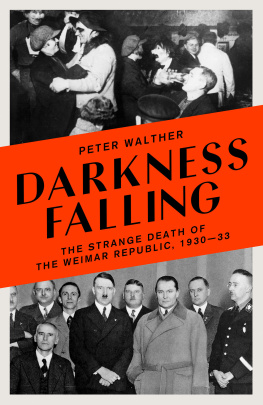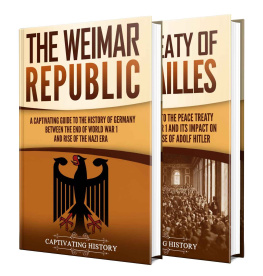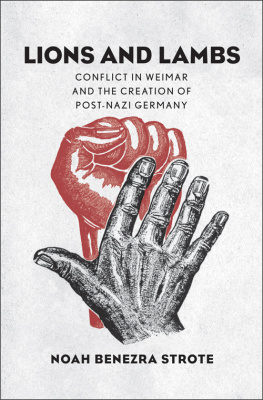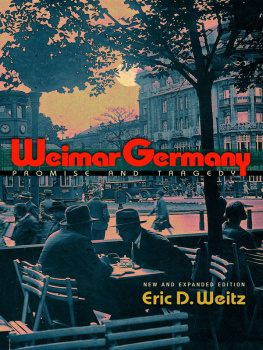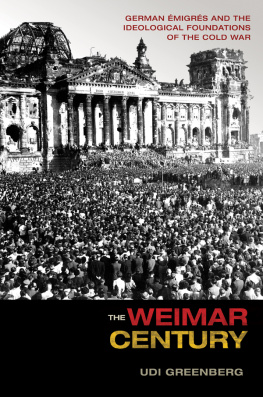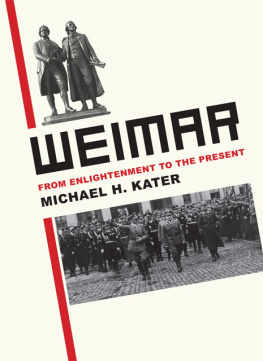DARKNESS
FALLING
DARKNESS
FALLING
THE STRANGE DEATH OF THE WEIMAR REPUBLIC, 193033
PETER WALTHER
Translated from the German by Peter Lewis
AN APOLLO BOOK
www.headofzeus.com
First published in Germany as Fieber in 2020 by Aufbau Verlag
This translation first published in the UK in 2021 by Apollo,
an imprint of Head of Zeus Ltd
The moral right of Peter Walther to be identified as the author and of Peter Lewis to be identified as the translator of this work has been asserted in accordance with the Copyright, Designs and Patents Act of 1988.
All rights reserved. No part of this publication may be reproduced, stored in a retrieval system, or transmitted in any form or by any means, electronic, mechanical, photocopying, recording, or otherwise, without the prior permission of both the copyright owner and the above publisher of this book.
A catalogue record for this book is available from the British Library.
The translation of this work was supported by a grant from the Goethe-Institut.

ISBN (HB): 9781800242265
ISBN (E): 9781800242289
Head of Zeus Ltd
58 Hardwick Street
London EC 1 R 4 RG
WWW.HEADOFZEUS.COM
CONTENTS
As if whipped on by unseen spirits, Times horses of Helios bolt, dragging behind them the flimsy chariot of our destiny and all we can do, with grim determination, is grasp the reins and steer the wheels now left and now right to try and stop ourselves from smashing into the cliff face or plunging into the abyss. Who knows where we will end up?
Goethe, Egmont , Act II
1929
24 October Beginning of the global economic crisis. Along with the USA, the German Empire is hardest hit.
1930
March An attempt to reform the unemployment insurance fund brings about the collapse of the Grand Coalition between the SPD, Centre and three smaller parties.
30 March Reich President Paul von Hindenburg names Heinrich Brning from the Catholic Centre Party as Chancellor. Brnings administration governs with the tacit support of sections of the German Nationalists and the SPD.
15 July After failing to win support for a piece of draft legislation, Brning dissolves parliament and calls new elections.
14 September In the parliamentary elections, the NSDAP increases its share of the vote from 2.6 to 18.3 per cent, becoming the second largest party in the Reichstag; the Communist KPD also gains an increased mandate (13.1 per cent).
25 September During a trial in Leipzig of National Socialist army officers accused of high treason, Hitler pledges to seek power solely through legal means (Legality Oath).
19 October With the support of the SPD, Brning defeats a parliamentary motion of no confidence brought against him.
1931
13 July The collapse of the Dresdner Bank and the Danat-Bank sparks a banking crisis in Germany.
9 August A plebiscite supported by the NSDAP, various right-wing parties and the KPD to dissolve the Prussian parliament fails to gain sufficient support.
12 September Anti-Semitic rioting erupts in Berlin (the Kurfrstendamm Pogrom).
11 October Formation of the anti-democratic Harzburg Front alliance by the NSDAP, the German National Party (DNVP) and a right-wing ex-servicemens association, the Stahlhelm.
25 November During a house search by police, the Boxheim Papers plans for a violent seizure of power by the National Socialists are discovered and made public.
16 December Formation of the left-wing Iron Front, an alliance between the Reichsbanner organization, trade unions and workers sporting associations.
1932
25 February Hitler is naturalized as a German citizen (a vital requirement for running in the 1932 presidential elections) after he is appointed as a delegate to the Reichsrat (upper house of the German parliament) for the Free State of Brunswick by its interior minister Dietrich Klagges, an NSDAP member.
10 April In the presidential election, Hindenburg secures victory over Hitler and Thlmann in the second round of voting and is returned as president.
13 April The SA and SS are proscribed by General Wilhelm Groener, who holds the portfolios of minister of the interior and defence minister.
24 April In regional elections in Prussia, the NSDAP increases its share of the vote from 1.84 to almost 37 per cent and becomes the strongest political force in the region; it also makes large gains in Bavaria, Wrttemberg, Saxony-Anhalt and Hamburg.
12 May Wilhelm Groener resigns as defence minister.
30 May Brning is dismissed as Chancellor by President Hindenburg.
1 June Franz von Papen is appointed Chancellor, heading a presidential cabinet.
14 June A secret agreement results in a lifting of the ban on the SA and SS; widespread violent civil unrest mars campaigning for the upcoming parliamentary election.
9 July The Lausanne Conference of delegates from the UK, Germany and France ends with an agreement to suspend Germanys crippling war reparations payments.
10 July Violent clashes between the NSDAP, Reichsbanner and communists in the Silesian town of Ohlau (Oawa).
17 July The Altona Bloody Sunday sees pre-election violence reach a high point. A firefight involving members of the SA and SS, communists and the police leaves eighteen dead. A report concludes most of them were killed by police gunfire.
20 July In the so-called Prussian Coup ( Preuenschlag ), the ruling SPD government of the state of Prussia is dissolved by emergency presidential decree; Papen is installed as Reich Commissar of Prussia.
31 July The NSDAP emerges from the parliamentary elections as the strongest party, with 37.4 per cent of the vote; the other big winners are the communists.
10 August In Potempa in Upper Silesia, SA stormtroopers carry out a brutal murder, beating a trade unionist to death in front of his mother; in the ensuing trial, Hitler expresses solidarity with the perpetrators.
13 August Hindenburg grants Hitler an audience; the Reich President refuses to name Hitler Chancellor.
12 September A vote of no confidence is passed against Papens government, forcing Hindenburg to dissolve parliament once more.
37 November Communists and National Socialists form a tactical alliance in support of a strike on the Berlin transport network. The management and unions of the capitals transport authority are dominated by the socialist SPD.
6 November In the parliamentary elections, the NSDAPs vote share falls to 33.1 per cent though it remains the strongest party.
17 November Franz von Papen resigns but continues in office as head of a caretaker government.
2 December Army minister Kurt von Schleicher is appointed the new Chancellor, while retaining his defence portfolio; his attempts to form a third position by building a coalition between the SPD, trade unions and more moderate elements of the NSDAP fail, nor does he succeed in splitting the NSDAP.
1933
4 January Secret meeting between Papen and Hitler at the house of the banker Baron Kurt von Schrder; Papen sounds out the possibility of forming a government with Hitler.
10 January Papen and Hitler meet at the villa of Joachim von Ribbentrop in Berlin-Dahlem.
15 January Following its losses in the parliamentary elections of the previous November, the NSDAP scores a symbolic victory when it wins control in regional elections held in the small state of Lippe.

